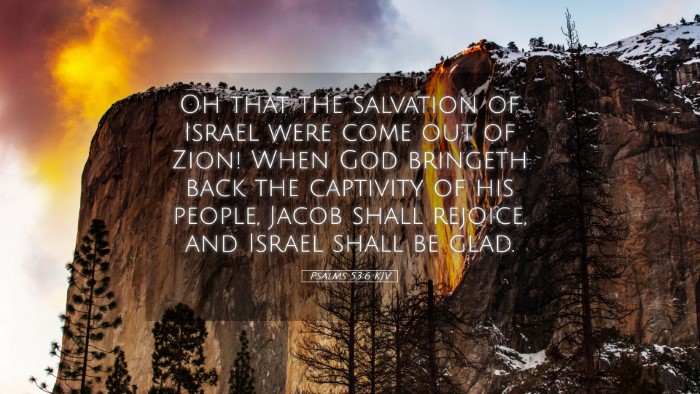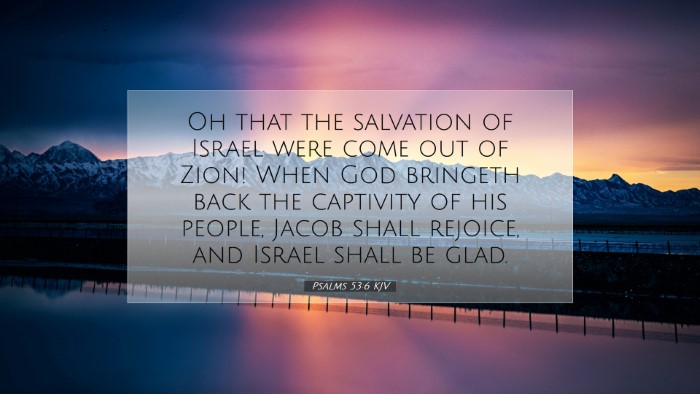Psalms 53:6 Commentary
Bible Verse: Psalms 53:6 (KJV) - "Oh that the salvation of Israel were come out of Zion! When God bringeth back the captivity of his people, Jacob shall rejoice, and Israel shall be glad."
Overview
This verse from Psalms captures a longing for redemption and the restoration of Israel. It presents a profound theological and eschatological significance, illustrating the deep yearning of the people for divine deliverance. In this commentary, we will explore insights from various public domain commentaries, including those by Matthew Henry, Albert Barnes, and Adam Clarke, to extract meaning for pastors, students, theologians, and Bible scholars.
Contextual Background
The Book of Psalms often reflects deep emotional states and serves various purposes, from individual lament to communal praise. Psalms 53, attributed to David, addresses the folly of denying God's presence and the consequent moral decay that ensues. This particular verse highlights a shift from lamentation to hope, focusing on the anticipated redemption.
Commentary Insights
Matthew Henry's Commentary
Matthew Henry emphasizes the dire need for salvation that is deeply felt among the people of Israel. He comments on the phrase "Oh that the salvation of Israel were come out of Zion," noting that Zion symbolizes both the physical location of Jerusalem and the spiritual heart of God's covenant with His people. Henry suggests that this cry signifies an earnest longing for divine intervention and restoration, reflecting a faith that God will ultimately deliver His people.
Albert Barnes' Notes
Albert Barnes offers a detailed analysis of the verse, stating that the expression "Oh that" indicates a fervent desire and expectation for salvation. He elaborates on the significance of "Zion" as the place where God chose to dwell among His people, and how this prophecy reflects both a present and future hope. Barnes connects the verse to the broader theme of redemption throughout the Psalms, emphasizing the joy that accompanies the return from captivity, a motif that resonates with the children of Israel's historical experiences.
Adam Clarke's Commentary
Adam Clarke provides a linguistic and theological exploration of the text, noting that the verse encapsulates both an immediate desire for deliverance and a prophetic vision for Israel's future. Clarke points out that "when God bringeth back the captivity of his people" alludes to God's faithfulness to restore His people, which he interprets as a promise of hope that transcends time. He further highlights the emotional response described: "Jacob shall rejoice, and Israel shall be glad," indicating the spiritual renewal and communal celebration that comes with God's salvation.
Theological Themes
- Divine Salvation: The longing for salvation in this verse reflects a central theme in the biblical narrative—the recognition of human need and God's provision.
- Hope in Restoration: The anticipation of restored fortunes signifies the hope inherent in the Israelite faith, fostering resilience amid despair.
- Covenant Relationship: This verse illustrates the profound connection between God and His people, reaffirming the covenantal promises associated with Zion.
Application for Today
This verse serves as a reminder for contemporary believers of the importance of hope in God’s promises amidst trials and uncertainty. The plea for salvation can resonate deeply in today's context, where many seek deliverance from various forms of spiritual and social captivity. It calls pastors and theologians to encourage faith in God's redemptive work and to remind congregations of the joy that follows restoration.
Conclusion
Psalms 53:6 encapsulates a profound expression of longing for divine salvation and restoration, rooted in the rich tradition of Israel's faith. Insights from respected commentaries provide a deeper understanding of the theological and emotional layers present in this verse, revealing timeless truths about God's unwavering commitment to His people. As we reflect on this scripture, may it inspire renewed faith and hope in the hearts of all who seek God's deliverance.


